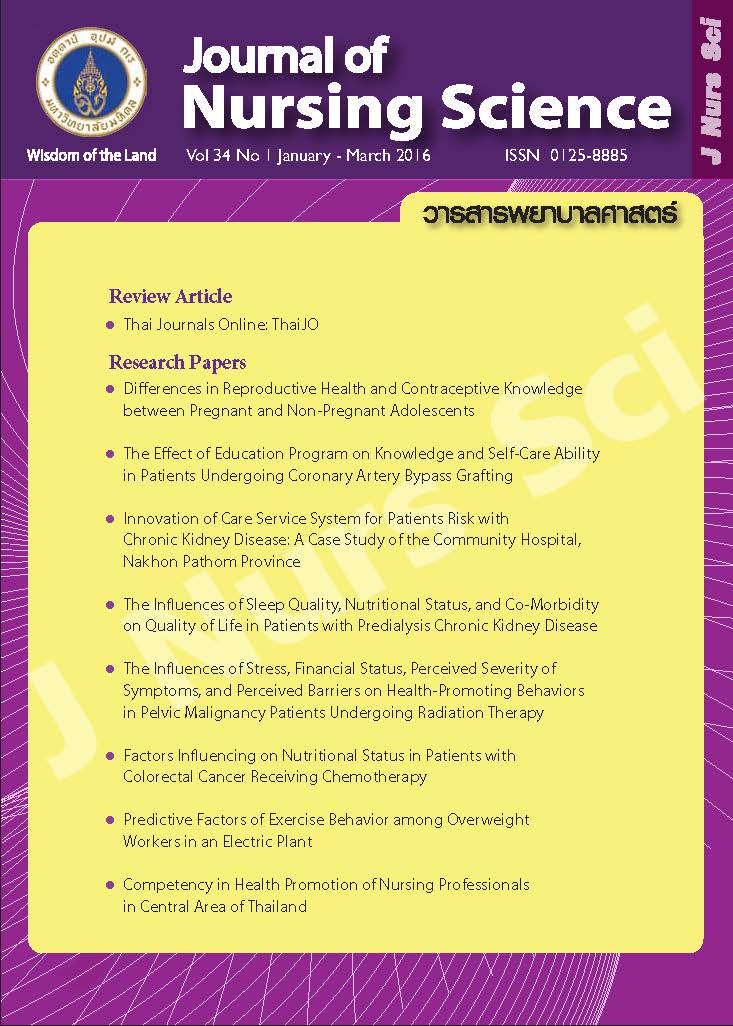The Influences of Sleep Quality, Nutritional Status, and Co-Morbidity on Quality of Life in Patients with Predialysis Chronic Kidney Disease
Main Article Content
Abstract
Purpose: To determine the influences of sleep quality, nutritional status, and co-morbidity on quality of life in patients with predialysis chronic kidney disease.
Design: A correlational predictive study.
Method: The sample included 100 chronic kidney disease patients with CKD stages 3 to 5 who were not currently undergoing renal replacement therapy and enrolled in the nephrology clinic at Chulalongkorn Hospital. Data were collected by using the demographic questionnaire, the Pittsburgh Sleep Quality Index (PSQI), the Mini Nutritional Assessment (MNA®), the Charlson Comorbidity Index (CCI) and the Thai version of the WHO’s Quality of Life Brief questionnaire (WHOQOL – BREF – THAI). All data were analyzed by using descriptive statistics and multiple regression analysis.
Main findings: The result indicated that the sample had quality of life in a moderate level (M = 93.65, SD = 15.51). All independent variables could explain 32.6 % of the variances in quality of life (R2 = .326, F(3, 96) = 15.457, p < .001). However, only sleep quality and nutritional status had statistically significant influences on this sample group (β = - .491, p < .001 and β = .192, p < .05).
Conclusion and recommendations: Nurses should concern with assessing sleep quality, nutritional status, and quality of life in patients with predialysis chronic kidney disease. Plan and actions to promote sleep quality, good nutritional status, and better quality of life are recommended.
อิทธิพลของคุณภาพการนอนหลับ ภาวะโภชนาการ และภาวะโรคร่วมต่อคุณภาพชีวิตในผู้ป่วยโรคไตเรื้อรังก่อนการบำบัดทดแทนไต
บทคัดย่อ
วัตถุประสงค์: เพื่อการศึกษาอิทธิพลของคุณภาพการนอนหลับ ภาวะโภชนาการ และภาวะโรคร่วมต่อคุรภาพชีวิตในผู้ป่วยโรคไตเรื้อรังก่อนการบำบัดทดแทนไต
รูปแบบการวิจัย: การศึกษาความสัมพันธ์เชิงทำนาย
วิธีดำเนินการวิจัย: กลุ่มตัวอย่างเป้นผู้ป่วยโรคไตเรื้อรัง ระยะที่ 3-5 และยังไม่ได้รับการบำบัดทดแทนไตที่มีการรับบริการที่คลินิกโรคไต โรงพยาบาลจุฬาลงกรณ์ จำนวน 100 คน เก็บรวบรวมข้อมูลโดยใช้แบบบันทึกข้อมูลส่วนบุคคลแบบประเมินคุณภาพการนอนหลับ แบบประเมินภาวะโภชนาการ แบบประเมินภาวะโรคร่วม และแบบประเมินคุณภาพชีวิต วิเคราะห์ข้อมูลโดยใช้สถิติเชิงพรรณนา และสถิติถดถอยเชิงพหุคูณ
ผลการวิจัย: กลุ่มตัวอย่างมีคุณภาพชีวิตโดยรวมอยู่ในระดับปานกลาง (M = 93.65, SD = 15.51) ตัวแปรอิสระสามารถร่วมกันอธิบายความผันแปรคุณภาพชีวิตของกลุ่มตัวอย่างได้ร้อยละ 32.6 (R2 = .326, F(3, 96) = 15.457,p < .001) ทั้งนี้พบว่าคุณภาพการนอนหลับและภาวะโภชนาการมีอิทธิพลต่อคุณภาพชีวิตของกล่มุ ตัวอย่างอย่างมีนัยสำคัญทางสถิติ (β = - .491, p < .001 และ β = .192, p < .05)
สรุปและข้อเสนอแนะ: พยาบาลควรตระหนักถึงความสำคัญในการประเมินคุณภาพการนอนหลับ ภาวะโภชนาการและคุณภาพชีวิตในผู้ป่วยโรคไตเรื้อรังก่อนการบำบัดทดแทนไต เพื่อเป็นแนวทางในการวางแผนการดูแล รวมทั้งส่งเสริมให้ผู้ป่วยมีคุณภาพการนอนหลับที่ดี มีภาวะโภชนาการปกติ และมีคุณภาพชีวิตที่ดีต่อไป
คำสำคัญ: โรคไตเรื้อรังก่อนการบำบัดทดแทนไต คุณภาพการนอนหลับ ภาวะโภชนาการ คุณภาพชีวิต
Article Details
Copyright Notice: Nursing Science Journal of Thailand has exclusive rights to publish and distribute the manuscript and all contents therein. Without the journal’s permission, the dissemination of the manuscript in another journal or online, and the reproduction of the manuscript for non-educational purpose are prohibited.

Disclaimer: The opinion expressed and figures provided in this journal, NSJT, are the sole responsibility of the authors. The editorial board bears no responsibility in this regard.

